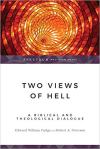Two Views of Hell is a debate between Edward W. Fudge and Robert A. Peterson about how long hell lasts. Fudge is a leading evangelical advocate for conditionalism, which teaches that the wicked will be destroyed body and soul in hell. He is the author of The Fire That Consumes, now in its third edition, the best single-volume treatment of conditonalism. Peterson is a leading evangelical advocate of traditionalism, which teaches the eternal conscious torment of the wicked in hell. He is the author of Hell on Trial, probably the best single-author treatment of traditionalism from a Reformed or Calvinist perspective currently available.
The debate follows a point-counterpoint format. Fudge opens Part One of Two Views on Hell with “The Case for Conditionalism.” Peterson then offers “A Traditionalist Response to Conditionalism.” Part Two reverses the order. Peterson makes “The Case for Traditionalism,” then Fudge offers “A Conditionalist Response to Traditionalism.” Each author makes his case on the basis of exegesis of relevant biblical texts combined with systematic theological considerations. Peterson also makes an argument from the testimony of leading theologians, but with Fudge, I don’t think such an argument is persuasive as to the truth of Peterson’s case, though it certainly explains why traditionalism is traditional.
To oversimplify the debate, the crucial issue is the meaning of the words deathand destruction on the one hand, and eternal on the other. (I’m sure Fudge and Peterson would blanch at my simplification, for they bring many more arguments to bear than just disputes over these words. But, I think my admitted oversimplification helps illuminate the essence of the debate.) For Fudge, the words death and destruction, which constitute the bulk of the Bible’s descriptions of the fate of the wicked, mean the literal cessation of bodily and spiritual existence. At the Final Judgment, God will pronounce sentence on the wicked and they will be annihilated, for lack of a better term. By contrast, Peterson understands the same words in terms of separation, loss, and ruin, not annihilation. Fudge argues that traditionalism assumes an unbiblical doctrine of the immortality of the soul. Because the soul exists immortally, whether it is saved or damned, hell must last eternally.
Peterson, on the other hand, believes that hell is eternal because the Bible speaks of “eternal punishment.” He cites ten biblical texts—two from the Old Testament, eight from the New—that lay the biblical foundation of the case for traditionalism: Isaiah 66:2–4; Daniel 12:1–2; Matthew 18:6–9; 25:31–46; Mark 9:42–48; 2 Thessalonians 5:1–10; Jude 7, 13; Revelation 14:9–11; and 20:10, 14–15. Although these are not Peterson’s or Fudge’s analogies, the tradtionalist hell is like life imprisonment without possibility of parole, while the conditionalist hell is like capital punishment. Both are final and irreversible, but whereas one is an eternal process of punishment, the other is a temporal sentence with eternal consequences.
If you’ve read any contemporary books on hell by evangelical authors, this book contains no surprises. Each author treads a well-worn path of argumentation. Each author makes the standard arguments for his position and the standard relies to his opponent’s. To me, despite the rigor of his arguments, Peterson came off a bit tetchy in his reply to Fudge and a bit dismissive of Fudge’s previous writings when he made his own case. By the end of the debate—that is, in his reply to Peterson—even Fudge seemed a bit peeved. One of the frustrating things about debates such as this is the mutual stupefaction each expresses at how the other could possibly believe what he does.
While I appreciate the scholarship Fudge and Peterson bring to their respective cases, this is not the book I would recommend if you’re looking for only one book about the evangelical debate on hell. I would start with Four Views on Hell, 2nd ed., edited by Preston Sprinkle (2016). It’s more recent, contains an argument for universalism and hints at a case for something like a traditional view that is more amenable to Arminians. If you’re collecting a library on the debate, however—as I seem to be doing—include this one.
 Book Reviewed
Book Reviewed
Edward William Fudge and Robert A. Peterson, Two Views of Hell: A Biblical and Theological Debate (Downers Grove, IL: InterVarsity Press, 2000).
P.S. If you like my review, please click “Helpful” on my Amazon review page.

